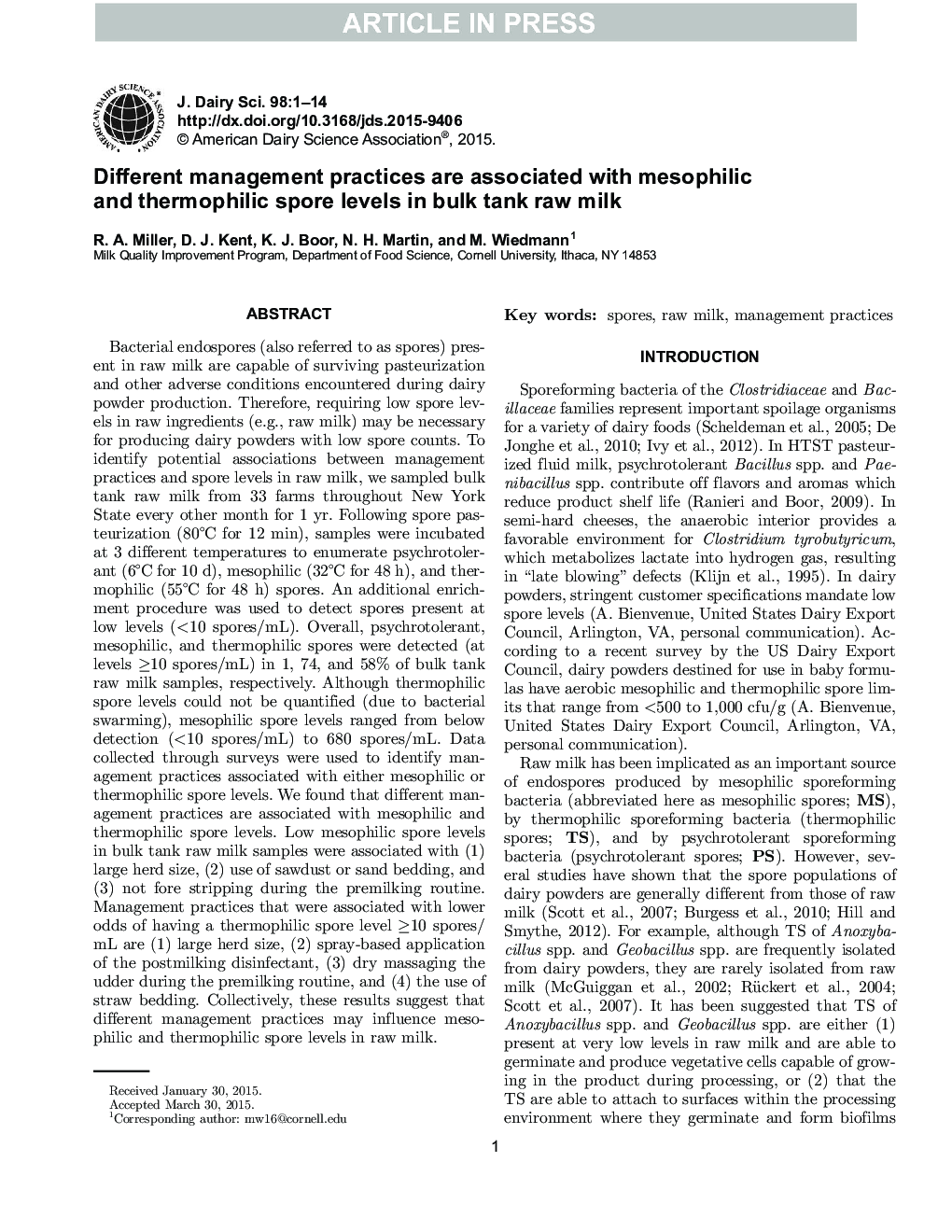| کد مقاله | کد نشریه | سال انتشار | مقاله انگلیسی | نسخه تمام متن |
|---|---|---|---|---|
| 10975231 | 1108032 | 2015 | 14 صفحه PDF | دانلود رایگان |
عنوان انگلیسی مقاله ISI
Different management practices are associated with mesophilic and thermophilic spore levels in bulk tank raw milk
ترجمه فارسی عنوان
شیوه های مختلف مدیریتی با میزان اسپور مزوفیل و ترموفیلیک در شیر خام مخزن فله ارتباط دارد
دانلود مقاله + سفارش ترجمه
دانلود مقاله ISI انگلیسی
رایگان برای ایرانیان
کلمات کلیدی
اسپورها، شیر خام، تمرین های مدیریتی،
موضوعات مرتبط
علوم زیستی و بیوفناوری
علوم کشاورزی و بیولوژیک
علوم دامی و جانورشناسی
چکیده انگلیسی
Bacterial endospores (also referred to as spores) present in raw milk are capable of surviving pasteurization and other adverse conditions encountered during dairy powder production. Therefore, requiring low spore levels in raw ingredients (e.g., raw milk) may be necessary for producing dairy powders with low spore counts. To identify potential associations between management practices and spore levels in raw milk, we sampled bulk tank raw milk from 33 farms throughout New York State every other month for 1 yr. Following spore pasteurization (80°C for 12 min), samples were incubated at 3 different temperatures to enumerate psychrotolerant (6°C for 10 d), mesophilic (32°C for 48 h), and thermophilic (55°C for 48 h) spores. An additional enrichment procedure was used to detect spores present at low levels (<10 spores/mL). Overall, psychrotolerant, mesophilic, and thermophilic spores were detected (at levels â¥10 spores/mL) in 1, 74, and 58% of bulk tank raw milk samples, respectively. Although thermophilic spore levels could not be quantified (due to bacterial swarming), mesophilic spore levels ranged from below detection (<10 spores/mL) to 680 spores/mL. Data collected through surveys were used to identify management practices associated with either mesophilic or thermophilic spore levels. We found that different management practices are associated with mesophilic and thermophilic spore levels. Low mesophilic spore levels in bulk tank raw milk samples were associated with (1) large herd size, (2) use of sawdust or sand bedding, and (3) not fore stripping during the premilking routine. Management practices that were associated with lower odds of having a thermophilic spore level â¥10 spores/mL are (1) large herd size, (2) spray-based application of the postmilking disinfectant, (3) dry massaging the udder during the premilking routine, and (4) the use of straw bedding. Collectively, these results suggest that different management practices may influence mesophilic and thermophilic spore levels in raw milk.
ناشر
Database: Elsevier - ScienceDirect (ساینس دایرکت)
Journal: Journal of Dairy Science - Volume 98, Issue 7, July 2015, Pages 4338-4351
Journal: Journal of Dairy Science - Volume 98, Issue 7, July 2015, Pages 4338-4351
نویسندگان
R.A. Miller, D.J. Kent, K.J. Boor, N.H. Martin, M. Wiedmann,
